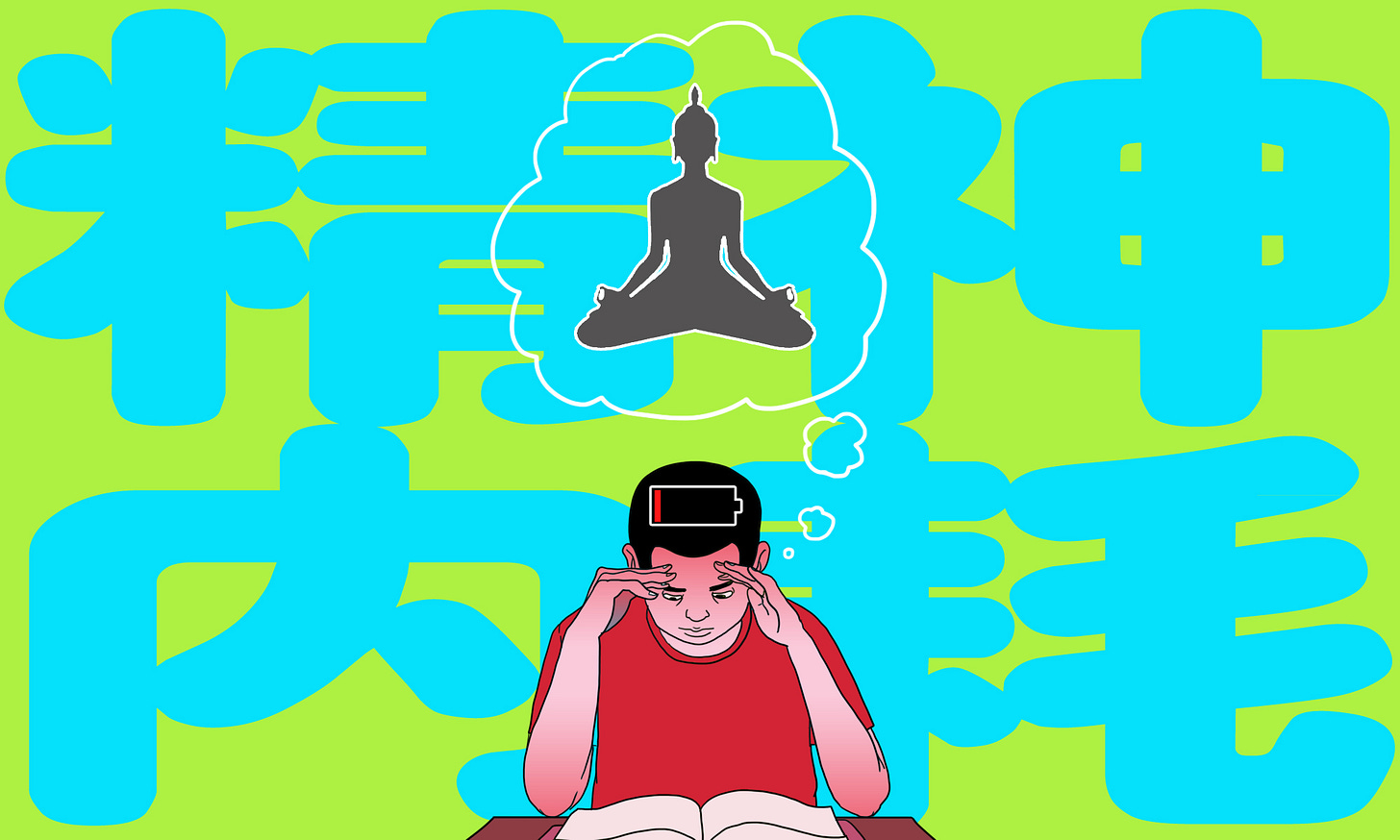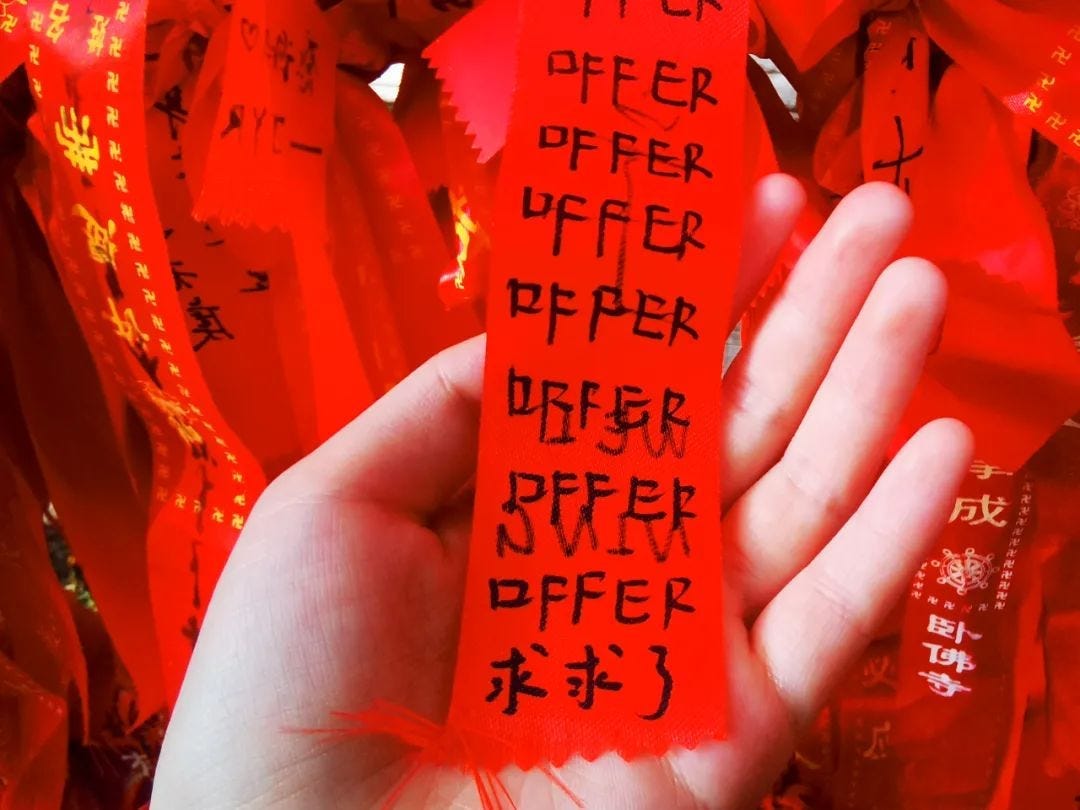Young people in China go to temples to relieve their anxieties
The latest trend of China's Gen Z "Buddhist Youth"
Welcome to RealTime Mandarin!
It’s a free weekly resource helping you learn contemporary Chinese in context, maintain and improve your Mandarin skills, and stay on top of the latest language trends in China.
Subscribe now to get the next newsletter in your inbox on Saturday.
Life for young people in China is full of internal anxieties, or 精神内耗 jīng shén nèi hào, as we learned last year.
Long working hours, intense competition, and coping with the stress of life in general are leading China’s GenZ-ers to turn to Buddhism:
When you open your social media feed, you will discover “Weekend Buddhism” has become a new trend in China.
当你打开社交媒体,也会发现“周末拜佛”成为一种新的潮流 [1]
China’s "Buddhist youth" (佛系青年 fó xì qīng nián) used to be a metaphor for the attitudes of young people towards life, also known as “lying flat” (躺平 tǎng píng):
But now China's Buddhist youth have actually gone Buddhist!
佛系青年真的开始“佛”了 [2]
Praying to Buddhas can help pass exams, get into the right universities, find the right job, and even help find wealth and happiness.
The language of this new trend is an unusual mix of old Chinese religious phrases, contemporary youth culture and internet slang, and even a bit of English thrown in.
The Temple of the Reclining Buddha (卧佛寺 wò fó sì) is the best place to go for passing exams and getting into your preferred university.
Why?
Because the name of Temple of the Reclining Buddha in Chinese sounds like the English word, “offer”.
Young people write notes saying “Get through the test, I’m begging you”, “Be assigned to a new position (in a company) that I want” and even just fill notes with the word “offer”.
卧佛寺,由于与“offer”谐音,尤其受到祈求上岸的年轻人欢迎。同学们在祈福条上写道,“上岸成功,求求了!”“转岗顺利”“拿到offer”,甚至把“offer”写满整个幅条 [1]
Whereas the Lama Temple, also known as the Yonghe Temple, is where you go to get support in your career:
China’s “lying flat” GenZ-ers go to the Lama Temple because apparently Emperor Yongzheng was a workaholic. So coming to get your career blessed here is the most effective.
00后躺平的年轻人理由让人垂泪:“雍正是工作狂,来雍和宫拜事业肯定灵。” [2]
Bracelets made of glass beads containing incense ash (香灰手串 xiānghuī shǒuchuàn) are big business.
Some internet influencers get paid to buy bracelets and have them blessed on behalf of students at temples. If you search for the Lama Temple online you’ll find that livestream events selling bracelets are in great demand.
网上代请,也就是网上代购业务。在直播间搜索雍和宫,代请手串的直播间十分热闹。 [2]
Some language is very specific and Chinese:
You must say “ask” not “buy” when you purchase a prayer bracelet. In the daily conversations of the urban youth where they code switch between Chinese and English , only the word “ask” remains traditionally Chinese.
张口必言“请”手串。在各种中英文夹杂的都市年轻人日常对话中,唯独这个“请”字,用得十分中华。 [2]
So that’s what we explore this week, a surreal mix of magic, superstition, modern consumerism, and pop culture filling the Buddha halls of some of China’s oldest temples.
Before we dig in, a quick reminder of the main temples and gods you need to know:
雍和宫 yōng hé gōng - Lama Temple
卧佛寺 wò fó sì - Temple of the Reclining Buddha
菩萨 pú sà - The Buddha or the Bodhisattva
文殊菩萨 wén shū pú sà - Manjusri Bodhisattva (the god you pray to to get help with studies)
In the podcast:
Today’s member podcast episode is 41 minutes in total, with 35 minutes of excellent native audio from our editor, Zoe Qian, including a fascinating deep dive into Buddhist phrases and words.
Become a member and unlock this amazing content now!
Favourite Five
1. 代请 dài qǐng
to pray on behalf of somebody else
众多黄牛网红也瞄准这一商机,在雍和宫外把代请手串、直播带货、串珠改装等业务做到飞起 - Lots of ticket scalpers and Internet celebrities are also aiming at this business opportunity. They have achieved great success outside the Lama Temple, by buying prayer bracelets on behalf of others, selling through livestream e-commerce, and doing bead modification. [2]
More: 请 qǐng - is specific in the context of Buddhism. It means to "buy" a prayer bracelet, but is the act of "asking" the gods for help.
Related: 代拜 dài bài - pray on behalf of someone else
2. 精神内耗 jīng shén nèi hào
internal anxieties
林晚成还是在大学四年中感受到强烈的精神内耗 - Lin Wancheng still felt deeply anxious and drained during his four years in college. [1]
Note: This is one of our top phrases of 2022.
3. 手无缚鸡之力 shǒu wú fù jī zhī lì
powerless
开门时间一到,只见平时上班手无缚鸡之力的年轻人,各个都像脚底抹油往前冲 - As soon as the opening time came, I saw the young people who usually sit at their desk and don't workout all rushing forward like they had oil on the soles of their feet. [2]
4. 风水轮流转 fēng shuǐ lún liú zhuàn
wind and water flows; things change, nothing lasts forever
多年前,故宫文创以朝珠耳机成功出圈,如今潮流的风水轮流转,雍和宫手串成了C位 - Many years ago, the Palace Museum made its name with gemstone earphones. Now things have changed, and the Lama Temple bracelet is the in-thing. [2]
5. 临时抱佛脚 lín shí bào fó jiǎo
grabbing the foot of the Buddha and praying; cramming
起初也纯粹因为好玩,“考试前临时抱‘佛’脚” - To begin with, it was just a bit of fun and for a bit of good luck. [1]
Note: Here the phrase is used literally. Zoe explains more in the podcast.
Consuming the Conversation
Useful Words
6. 刹 chà
temple; pagoda
年轻人们在上面分享各地寺庙的攻略和注意事项、各刹“最灵”的菩萨 - Young people share the guides to temples and the best Bodhisattvas to pray to in each one. [1]
Related: 名刹 míng chà - Famous temple
7. 佛 fó
Buddha, zen
当然除了偶尔真的想“佛”一下,近些年的寺庙建筑设计,确实是越来越优秀了 - Of course, apart from occasionally wanting to "go Buddha", the architectural design of temples in recent years has indeed become better and better. [3]
Note: this 佛 has to be understood in context, here it means something similar to having a “zen attitude” (to relax and not worry too much).
Pronunciation: Always pronounced fó unless in 仿佛 (fǎng fú).
Related:
佛祖 fó zǔ - Buddha
礼佛 lǐ fó - Buddha
佛殿 fó diàn - Buddhist hall
8. 灵 líng
answer to one's prayer
卧佛寺很灵的,可以去拜一拜 - The Temple of the Reclining Buddha does answer to your prayers, so you should pay a visit. [1]
9. 信众 xìn zhòng
believers
把观音殿两层的地扫一遍、拖一遍,再整理信众送来的供品 - He sweeps and mops the ground on the two floors of the Guanyin Hall, and then sorts out the offerings sent by the believers. [1]
10. 祈求 qí qiú
pray
我的目标比较简单明确,第一次就是去祈求上岸,第二次就是感谢佛祖 - My goal is relatively simple and clear. The first time is to pray to pass my exam, and the second time is to thank the Buddha. [1]
Related:
祈福 qí fú - pray for good things to happen
祈祷 qí dǎo - pray
祈愿 qí yuàn - pray
11. 法物 fǎ wù
(Buddhist) religious object
80%找她代请法物的年轻女孩都在求事业和学业,“独立女性,每天都在想怎么挣钱,这个真的特别明显” - 80% of the young girls who asked her to buy Buddhist objects on their behalf are looking for help in their careers and studies. "Independent women are thinking about how to make money every day. This is really obvious." [1]
12. 开光 kāi guāng
'open light'; consecrate, bless
她一方面清楚地知道这不过是一个商品交换,另一方面还是拿着它进寺去开了光 - She clearly knew that this was purely transactional, but she still took it into the temple to have it blessed. [1]
13. 上香 shàng xiāng
burn incense as an offering to a god
看着周围的人也都在安静地祈福上香,她会觉得大家原来还有那么多的欲望 - Seeing the people around her quietly praying and offering incense, she felt that everyone still has so many desires. [1]
Related:
烧香 shāo xiāng - burn incense
香客 xiāng kè - someone who buys incense
14. 秒杀 miǎo shā
kill off in seconds; much better than
回去当天朋友就收到了新的秋招offer,而且开出的待遇条件秒杀之前的所有 - On the day I went back, my friend received an offer letter for the autumn term. The conditions of the offer were much better than all previous ones. [2]
More: Originally an internet slang term referring to discount tactics of online sellers, with some products selling out in seconds.
15. 拉踩 lā cǎi
put someone or something down
相比较于对事业的执念,时下的年轻人对姻缘却是一脸拉踩 - Compared with their obsession with their careers, young people nowadays couldn't care less about marriage. [2]
Note: An internet slang word meaning to put someone down to make yourself look better.
Three-character phrases
16. 安慰剂 ān wèi jì
placebo; comfort
是一种像安慰剂一样的东西,大家可能是焦虑的心情需要在这里缓解一下 - It is a placebo-like thing. People need to relieve their anxiety here. [1]
17. 烦心事 fán xīn shì
troubles, worries, anxiety
当每次谈及找工作时的烦心事,安汶只道,“今天的经抄得还不够多,回去还要多抄一遍 - Whenever talking about the anxiety of job hunting, An Wen only said, "I haven't copied enough scriptures today, and I have to copy more when I go back." [2]
Idioms
18. 成群结队 chéng qún jié duì
in large numbers
几乎看不到几个老年人的身影,放眼望去,成群结队的年轻人正举着燃烧的香火 - There are hardly any elderly people, but as far as the eye can see, crowds of young people hold burning incense. [1]
19. 茫茫人海 máng máng rén hǎi
a big crowd
甚至有人会向佛祖报出身份证号,生怕佛祖不能在茫茫人海中准确地定位到自己 - Some people even tell their ID number to the Buddha, for fear that the Buddha could not remember them in such large numbers of people. [1]
20. 层层叠叠 céng céng dié dié
layers upon layers
三世佛殿两旁的祈福架上,红色的祈福条系得层层叠叠 - On the prayer racks on both sides of the Sanshi Buddha Hall, red prayer strips are tied in layers. [1]
21. 万里挑一 wàn lǐ tiāo yī
one in ten thousand
她目前已经考过四五场,还没有成为万里挑一的幸运儿 - She has passed four or five exams so far, but has not yet become the lucky one in a million. [1]
22. 一时无两 yì shí wú liǎng
unparalleled in a given period of time
雍和宫手串的风头一时无两,搞得连在朋友圈再谈故宫文创,都显得过时和老土 - The Lama Temple bracelets are the most popular among people to the point that it seems outdated and tacky to talk about the Palace Museum products on WeChat. [2]
Note: 老土 lǎo tǔ is another way to say tacky which we discussed last week.
Phrases
23. 乌央乌央 wū yāng wū yāng
chaotic; lots of people
真的是乌央乌央的,可能说当时胸怀大志,说要自己干出一番事业的年轻人,现在都去考编了 - It’s so chaotic. Before, many young people had the aspiration to become an entrepreneur and build their own career. Nowadays they are all looking to take the civil servant exams. [1]
Note: A Beijing dialect word, originally the characters 雾坱雾坱 wù yǎng wù yǎng.
24. 青烟袅袅 qīng yān niǎo niǎo
smoke curling up
青烟袅袅,每个人看起来都有一定程度的心事,又做着相似的仪式 - As the green smoke curls up, everyone is doing the same rituals with some worries weighing on their minds. [1]
25. 四方神明 sì fāng shén míng
the four gods in the four directions of the compass
拜佛要拜四方神明,不能只对着佛像这一个方向拜 - When you pray to the Buddha you have to do it properly. You can’t just do it in one direction as you face it. [1]
Note: This is what you do if you're really looking for the answers to your prayers!
Become a member of RealTime Mandarin+
The RealTime Mandarin+ membership is a multimedia resource helping you learn contemporary Chinese in context
If you enjoyed reading the free newsletter, you’ll LOVE our paid membership: RealTime Mandarin+.
Joining Real-Time-Mandarin+, you’ll unlock loads of extra resources to help you dramatically improve your Chinese language skills.
Every week you get access to new content:
🔈Podcast - 30 min podcast every Saturday with 80% native Mandarin (including transcript)
📚 Resources and integrations - Pleco, Skritter, Hack Chinese, mylingua (new!), and PDF printouts
👩🎓 Intermediate newsfeed - One ‘real’ Chinese language news podcast and article published every Sunday, in a lesson format, pitched at an intermediate level
💬 Community - Slack community, Substack Chat, online meet-ups, in-person gatherings
🤿 Quarterly Deep Dives - One hour webinars focussing on one key challenge of intermediate learners delivered around the end of every quarter.
When you join, you’ll also have an optional 1-1 onboarding and coaching call to help orientate you.
It’s the best way to get motivated, inspired, and kick-start your Mandarin learning habit.
You can access all of these resources for less than the cost of one pint per week in a London pub.
It’s a no brainer (and much better for you)!
So, if you’ve been on the fence for a while, now is the time to confront it, invest in yourself, and commit!
Happy learning!
Andrew







